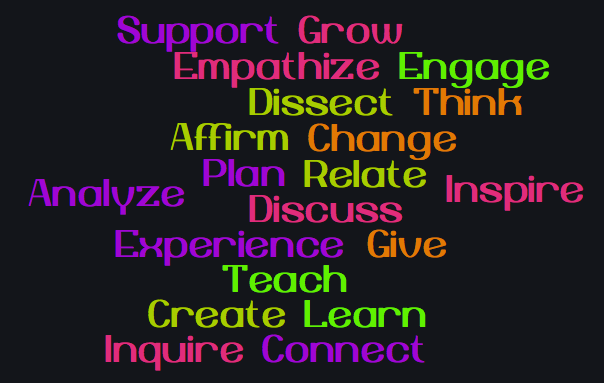Posts Tagged ‘language’
How Language Affects Our Teaching Practices
I had the privilege of hearing two Native American women, Rina Swentzell and Tessie Naranjo, talk about their mission to “save” the Tewa language from extinction. What was profound about their talk was their discussion of the power that language has to influence how we think and what we do; and that language is culturally determined.
Rina Swentzell posed the following questions during her talk:
- What is our relationship to words?
- How does language connect us?
- How does language become representative of our hearts?
Dr. Swentzell went on to contrast Tewa to the English language. Tewa language is softer, European languages harsher and harder. Tewa language focuses on verbs; as a doing-ness. European language emphasizes noun – the things. Tewa is inclusive, European languages often are not. She also discussed how very similar words have different meanings, For example, the Tewa words for to teach and to learn are closely related to “to breath”. She also wondered, “How does English affect our thinking and change us?”
Guy Deutscher author of “Through the Language Glass: Why the World Looks Different in Other Languages” notes:
When your language routinely obliges you to specify certain types of information, it forces you to be attentive to certain details in the world and to certain aspects of experience that speakers of other languages may not be required to think about all the time. And since such habits of speech are cultivated from the earliest age, it is only natural that they can settle into habits of mind that go beyond language itself, affecting your experiences, perceptions, associations, feelings, memories and orientation in the world.
As an educational reformer, this lead me to give more thought about the language used for educational culture in the United States and how this language affects teaching and learning practices. Some common educational terminology includes (a sampling):
- Standards
- Objectives
- High Stakes Tests
- “Class” room
- Accountability
- Schedule
- Benchmarks
- Mastery
- Methodology
- Performance-Based
This words, as analyzed in relation to Dr. Swentzell’s comments, are nouns, do not focus on the doing-ness or actions that can/should be taken by administrators, teachers, and students, are non-nurturing, and do not emphasize relationship.
So maybe, as in line with the language of the Tewa, the discussions surrounding education could/should focus on the verbs, on the doing-ness of administrators, educators, and learners with each other, the content, and the world-at-large. A sampling of action verbs for education include:
- Teach
- Learn
- Think
- Give
- Plan
- Support
- Experience
- Engage
- Inspire
- Inquire
- Change
- Grow
- Discuss
- Dissect
- Affirm
- Analyze
- Relate
- Empathize
- Connect
- Create
Such intentional use of language would, as research suggests, change the way we think about and ultimately DO education.
Math teacher, Jason Faulkner , How We Talk About Education Shows What It Means To Us reflects on how his thinking about education affects his teaching practices.
As I reflect on how this narrative is told in my own classroom, Parker Palmer’s words weigh heavily on my heart. As the teacher, one who Palmer calls “the mediator between the knower and the known, the living link in the epistemological chain,” do I not surreptitiously perpetuate an “epistemological error” in my classroom whenever I present knowledge as something to possess or control or master, rather than as a gift to love?
Those serious about educational reform based at putting the learner at the center, need to take a long, critical, dissecting examination at the terminology we use to explain teaching and learning.


